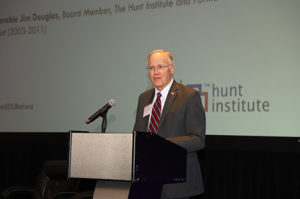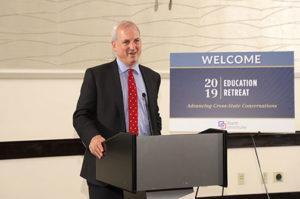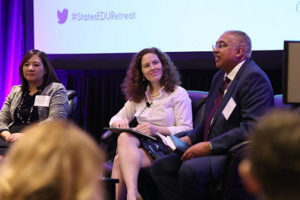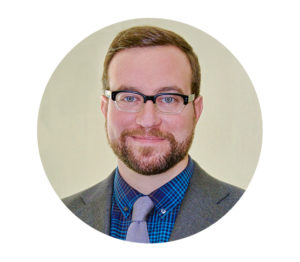

April 19, 2019

Last week, The Hunt Institute brought key state policymakers together in Washington, D.C. for the 2019 Education Retreat: Advancing Cross-State Conversations. The Retreat, which featured an evening keynote speech followed by a half-day of policy discussions, was held in conjunction with the Ronald Reagan Institute and their 2019 RISE Summit.
The Retreat focused on bringing together high-level state leaders from governors’ offices, state legislatures, state boards of education, and other key stakeholders. In total, 14 states were in attendance. Two former governors, Governor Jim Douglas of Vermont and Governor Susana Martinez of New Mexico, joined the state team members and shared their insights throughout the meeting.

Former Gov. of Vermont and Hunt Institute Board Member Jim Douglas
Attendees of the Retreat enjoyed full access to the 2019 RISE Summit thanks to our partnership with the Ronald Reagan Institute. It was a real thrill to watch how the programming of both events complemented each other – RISE provided a strong signal from a presidential foundation that education must be a nationwide, bipartisan priority, and The Hunt Institute brought state policymakers to the table to emphasize the important role that state leadership plays in driving change on these issues. The conversations that I heard throughout both events really drove home the importance of collaboration at every level as attendees reflected on how they can learn from federal experts, colleagues in their own state, and counterparts in other states.
The agenda for the Retreat was designed to complement the high-level policy conversations at RISE by giving state team members an opportunity to drill down on four specific policy issues:
All attendees received an Issue Brief prior to the meeting so that everyone would be on the same page for the discussions throughout the Retreat. To help further set the stage for Friday’s policy sessions, state team attendees gathered on Thursday afternoon to discuss the topics highlighted above in small groups. After Dr. Javaid Siddiqi, President & CEO of The Hunt Institute, gave an overview of the Retreat agenda, participants around each table identified learning goals for each session that would be most relevant to the work they do in their home state. The Hunt Institute team participated in the small group conversations, watching connections being made in real time as policymakers compared notes with their counterparts from other states on how they approached similar education policy challenges.

Jon Schnur, Chairman and CEO of America Achieves
The Retreat programming on Thursday ended with keynote remarks from Jon Schnur, Chairman & CEO of America Achieves. Schnur drew on his decades of higher education experience in the nonprofit, government, and philanthropy spaces to share lessons learned about effective strategies to help students succeed in higher education. The state team members were excited to hear his remarks, and it was clear that the feeling was mutual – at one point Schnur noted that “There’s no one better than our state teams to help drive this collaborative action.”
We were very lucky to be joined by three state leaders from Virginia – former Education Secretary and current Hunt Institute Board Member Laura Fornash, Superintendent James Lane, and Education Secretary Atif Qarni – who began Friday’s sessions by discussing how they convened stakeholders from across the state to develop a set of shared education policy goals. The state teams in attendance, some of whom are in the process of developing similar strategic plans, asked questions about how the team from Virginia developed the partnerships necessary to reach consensus.

Richard Gonzales, Senior Advisor for Early Childhood Development, U.S. Dept. of HHS, Marica Cox Mitchell, Director of Early Learning, Bainum Family Foundation and Rachel Schumacher, Senior Advisor of Early Childhood, The Hunt Institute
Attendees also participated in discussions about two education policy issues that are top-of-mind for many education thought leaders: early learning and school leadership. First, Hunt Institute Senior Advisor Rachel Schumacher moderated a conversation with Marica Cox Mitchell from the Bainum Family Foundation and Richard Gonzales from the U.S. Department of Health and Human Services. Policymakers heard about strategies for leveraging the emerging evidence based on early brain development to secure buy-in for early learning programs in their states, and about how they can use the federal Preschool Development Grant Birth through Five program to coordinate early learning services.
The discussion on school leadership, led by Andy Cole of The Wallace Foundation, was especially timely given the recent release of a RAND Corporation study that evaluated the effectiveness of Wallace’s principal pipeline initiative. Cole was joined by Hanseul Kang, Superintendent of Education in the District of Columbia, who shared how state leaders can think creatively about different strategies to reimagine the roles of principals in their state. Sarah Rosenberg from New Leaders added insight about important characteristics of principal preparation programs that produce highly-effective school leaders.

Andy Cole of The Wallace Foundation with DC State Superintendent Hanseul Kang (left) and Sarah Rosenberg, Senior Director of Policy for New Leaders
In order to capture all of the lessons learned throughout the Retreat, Hunt Institute staff created a Key Takeaways document, which was provided to all attendees, that includes suggestions on how state teams can take action once they return to their home state.
The Hunt Institute is very appreciative of the organizations who made this Retreat possible, including the John M. Belk Endowment, Bill & Melinda Gates Foundation, Dominion Energy, Pritzker Children’s Initiative, SAS Institute, Charles and Lynn Schusterman Family Foundation, Saul Zaentz Charitable Foundation, State Farm, and The Wallace Foundation.
[metaslider id=4366]
For additional photos, visit our Facebook page, and for additional conversation about the Retreat, search #StatesEDURetreat on Twitter.
Author
James Mikolowsky
Policy Analyst, The Hunt Institute
